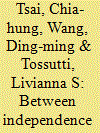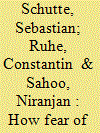| Srl | Item |
| 1 |
ID:
086458


|
|
|
|
|
| Publication |
2008.
|
| Summary/Abstract |
The evolution of a multiparty system in Taiwan has seen public opinion about the independence/unification issue coinciding with partisan positions. While aggregate public opinion data have shown that most Taiwanese support the current cross-Strait relations, or "status quo," less is known about the stability of individual policy preferences. Drawing on panel data from Taiwan's Election and Democratization Study (TEDS) project, this article examines whether the same respondents maintained the same position on the constitutional question in 2001 and 2004. Using ordered probit modeling, it also assesses the impact of previously-held opinions and rational assessments on attitudes in 2004, net of standard sociological and psychological determinants. We find that nearly half of respondents changed their preferences between 2001 and 2004. When opinions did change, there was a trend toward support for the status quo from a pro-unification position. In addition to showing the lag impact of a previous attitude, our analysis confirms that self-identified nationality, partisanship, and rational assessments of Taiwan's economy are significant predictors of positions on the independence/unification issue.
|
|
|
|
|
|
|
|
|
|
|
|
|
|
|
|
| 2 |
ID:
190934


|
|
|
|
|
| Summary/Abstract |
Earlier research on ethnic and religious conflict has identified fear as an important motivation. While theoretically sound, this expectation has never been tested at larger scales in ongoing episodes of political violence. Instead, conceptual progress has been made in lab experiments. Combining insights from observational research and stylized experiments, we predict that fear for personal safety due to witnessed violence causes prejudice against out-groups, enhanced internal cohesion, and support for extremist actors. To test these predictions, we conducted surveys in the Indian State of Uttar Pradesh with identical respondents in three waves starting in January 2017. The surveys continued during the tense Legislative Assembly elections in the Spring. The results largely corroborate the theoretical expectations and present a hard in-vivo test of long-standing conjectures.
|
|
|
|
|
|
|
|
|
|
|
|
|
|
|
|